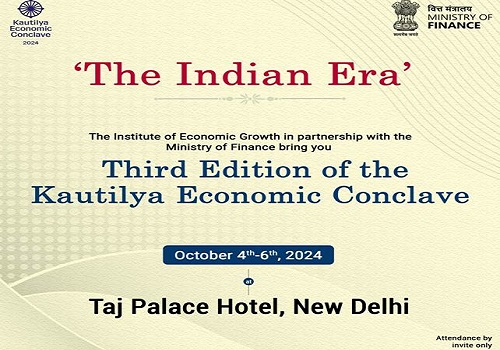
Prime Minister Narendra Modi will deliver an address on Friday on the opening day of the three-day Kautilya Economic Conclave, which will feature nearly 150 Indian and international academicians and policymakers discussing issues faced by India and other countries of the Global South.
The conclave, being organised by the Institute of Economic Growth in partnership with the Ministry of Finance, will be inaugurated by Finance Minister Nirmala Sitharaman and Prime Minister Modi will participate at around 6.30 p.m. and also address the gathering, an official statement said.
The third edition of the Kautilya Economic Conclave will be held from October 4 to October 6 and the focus this year is on themes such as reforming the international financial architecture, financing the green transition, geo-economic fragmentation and the implications for growth, India and the middle-income trap, jobs and skilling, artificial intelligence and public policy design, and the principles for policy action to preserve resilience.
Among those slated to attend are External Affairs Minister Dr S. Jaishankar, who will address the closing session, Bhutan's Finance Minister Lyonpo Lekey Dorji, PM Modi's Principal Secretary, P. K. Mishra, Centre for Global Development's President Emeritus Masood Ahmed, Chair, Liquidity and Sustainability Facility and co-chair, High-Level Panel, Finance for Climate Action, Vera Songwe, Policy Research Institute's (Bangladesh) founder Chairman and Chief Executive Dr Zaidi Sattar, Peking University's Institute of New Structural Economics Dean Justin Yifu Lin, Asian Infrastructure Investment Bank's Chief Economist Erik Berglof, Pacific Economic Cooperation Council Secretary General Eduardo Pedrosa, NITI Aayog Vice Chairman Suman Beri, 16th Finance Commission Chairman, Dr Arvind Panagariya, World Bank's Regional Vice President for South Asia Martin Raiser, among others.
Some of the discussions in these sessions over the three days will range from how the Indian economy can create more regular jobs; how the rules-based multilateral system must adapt to prevent geo-economic fragmentation, and how progress through multilateral consensus can be made possible; harnessing India’s comparative advantage in AI, ML, and Fintech for job creation; assessing India’s current growth trajectory and considering ways in which India can maintain productivity growth by maximising catch-up growth and developing innovation capabilities; studying the reforms needed to make the financial system more resilient as well as efficient; identifying the longer-term reforms needed to achieve the goals of sustainable development; and discussing the challenge of managing climate change and achieving an energy transition to renewable energy.
The conclave will also showcase India’s increasing role as a bridge-maker of countries in the global south. The discussions in the conclave will serve as a precursor to the upcoming Annual Meetings of the IMF and the World Bank, COP 29, and the Brazilian G20 Leaders’ Declaration.
